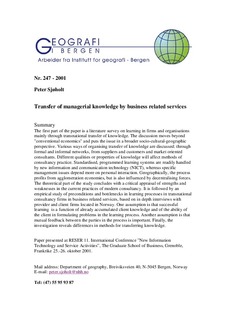Transfer of managerial knowledge by business related services
Research report
Permanent lenke
http://hdl.handle.net/11250/162340Utgivelsesdato
2001Metadata
Vis full innførselSamlinger
- Geografi i Bergen [35]
Sammendrag
The first part of the paper is a literature survey on learning in firms and organisations
mainly through transnational transfer of knowledge. The discussion moves beyond
"conventional economics" and puts the issue in a broader socio-cultural-geographic
perspective. Various ways of organising transfer of knowledge are discussed: through
formal and informal networks, from suppliers and customers and market oriented
consultants. Different qualities or properties of knowledge will affect methods of
consultancy practice. Standardised, programmed learning systems are readily handled
by new information and communication technology (NICT), whereas specific
management issues depend more on personal interaction. Geographically, the process
profits from agglomeration economies, but is also influenced by decentralising forces.
The theoretical part of the study concludes with a critical appraisal of strengths and
weaknesses in the current practices of modern consultancy. It is followed by an
empirical study of preconditions and bottlenecks in learning processes in transnational
consultancy firms in business related services, based on in depth interviews with
provider and client firms located in Norway. One assumption is that successful
learning is a function of already accumulated client knowledge and of the ability of
the client in formulating problems in the learning process. Another assumption is that
mutual feedback between the parties in the process is important. Finally, the
investigation reveals differences in methods for transferring knowledge.
Utgiver
University of Bergen. Department of GeographySerie
Geografi i Bergen247
